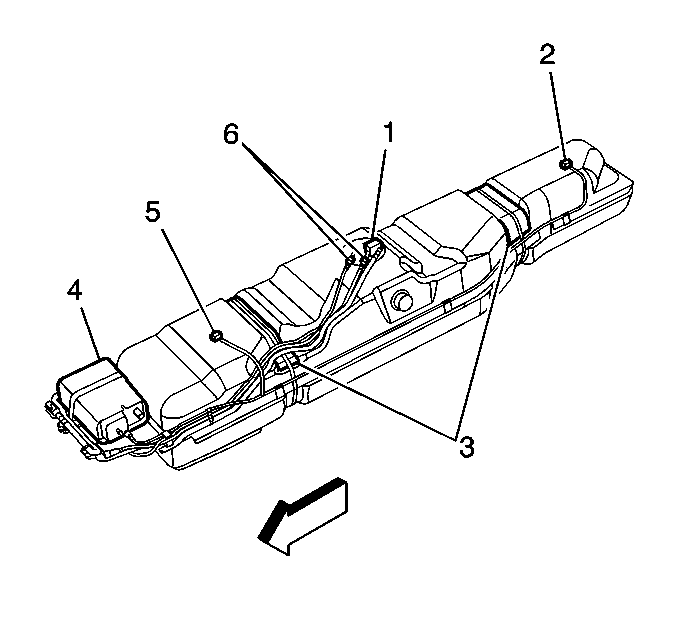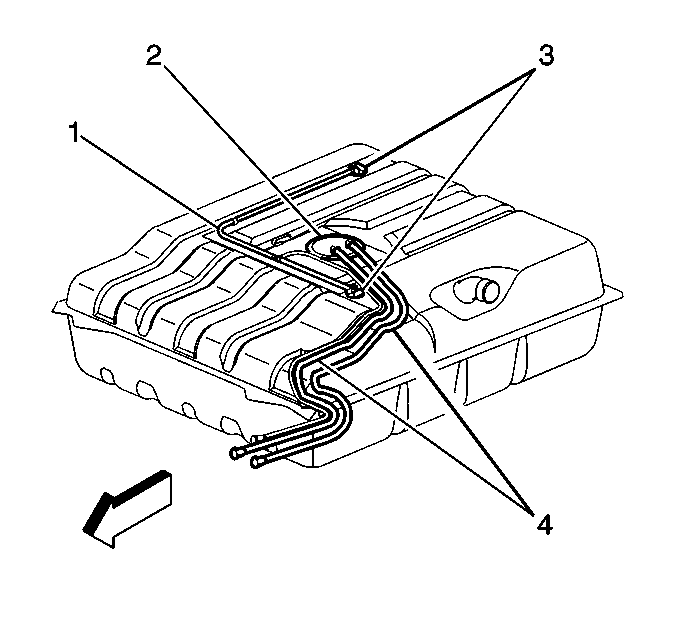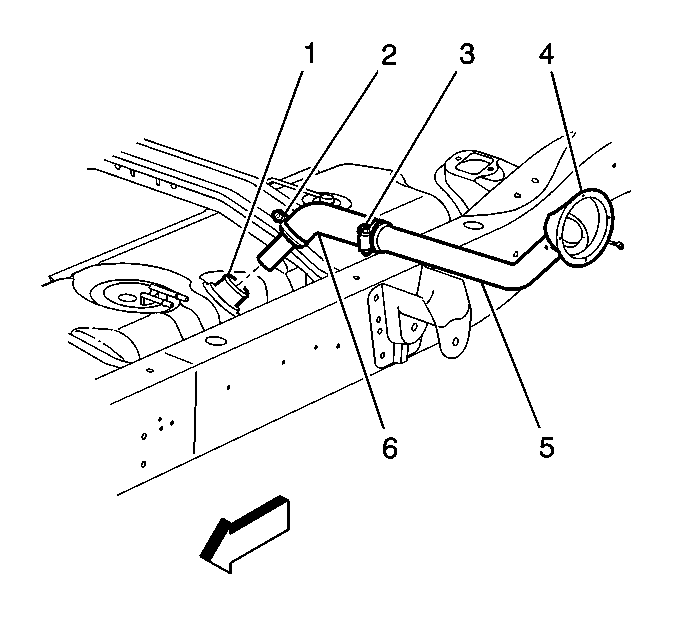Fuel Hose/Pipes Assembly Replacement Passenger/Cargo Van Fuel Tank Pipes
Removal Procedure

Caution: Unless directed otherwise, the ignition and start switch must be in the OFF or LOCK position, and all electrical loads must be OFF before servicing
any electrical component. Disconnect the negative battery cable to prevent an electrical spark should a tool or equipment come in contact with an exposed electrical terminal. Failure to follow these precautions may result in personal injury and/or damage to
the vehicle or its components.
- Disconnect the negative battery cable.
- Relieve the fuel system pressure. Refer to
Fuel Pressure Relief
.
- Drain the fuel tank. Refer to
Fuel Tank Draining
.
- Remove the fuel tank. Refer to
Fuel Tank Replacement
.
- Remove the fuel feed and return pipes (6) from the fuel sender (1), the fuel filter, and the retaining clips.
Installation Procedure

- Install the fuel feed and return pipes (6) to the fuel sender (1), the fuel filter, and the
retaining clips.
- Install the fuel tank. Refer to
Fuel Tank Replacement
.
- Lower the vehicle.
- Refill the fuel tank.
- Tighten the fuel filler cap.
- Connect the negative battery cable.
- Inspect for leaks:
| 7.1. | Turn ON the ignition for 2 seconds. |
| 7.2. | Turn OFF the ignition for 10 seconds. |
| 7.3. | Turn ON the ignition . |
| 7.4. | Inspect for fuel leaks. |
Fuel Hose/Pipes Assembly Replacement Cutaway Van Rear Tank Fuel Tank Pipe
Removal Procedure

Caution: Unless directed otherwise, the ignition and start switch must be in the OFF or LOCK position, and all electrical loads must be OFF before servicing
any electrical component. Disconnect the negative battery cable to prevent an electrical spark should a tool or equipment come in contact with an exposed electrical terminal. Failure to follow these precautions may result in personal injury and/or damage to
the vehicle or its components.
- Disconnect the negative battery cable.
- Relieve the fuel system pressure. Refer to
Fuel Pressure Relief
.
- Drain the fuel tank. Refer to
Fuel Tank Draining
.
- Remove the fuel tank. Refer to
Fuel Tank Replacement
.
- Remove the fuel feed and return pipes (4) from the fuel sender (2).
Installation Procedure

- Install the fuel feed and return pipes (4) to the fuel sender (2).
- Install the fuel tank. Refer to
Fuel Tank Replacement
.
- Lower the vehicle.
- Refill the fuel tank.
- Tighten the fuel filler cap.
- Connect the negative battery cable.
- Inspect for leaks:
| 7.1. | Turn ON the ignition for 2 seconds. |
| 7.2. | Turn OFF the ignition for 10 seconds. |
| 7.3. | Turn ON the ignition. |
| 7.4. | Inspect for fuel leaks. |
Fuel Hose/Pipes Assembly Replacement Cutaway Van Side Tank
Removal Procedure

Caution: Unless directed otherwise, the ignition and start switch must be in the OFF or LOCK position, and all electrical loads must be OFF before servicing
any electrical component. Disconnect the negative battery cable to prevent an electrical spark should a tool or equipment come in contact with an exposed electrical terminal. Failure to follow these precautions may result in personal injury and/or damage to
the vehicle or its components.
- Disconnect the negative battery cable.
- Clean all the fuel pipe and hose connections and the surrounding areas before disconnecting in order to avoid possible contamination of the fuel system.
- Remove the fuel filler cap.
- Drain the fuel below the level of the fuel tank fill hose. Refer to
Fuel Tank Draining
.
- Raise the vehicle. Refer to
Lifting and Jacking the Vehicle
.
- Loosen the fuel fill hose clamps (2, 3).
- Remove the fuel fill hose (6).
- Cap the open end of the fuel tank.
Installation Procedure

- Uncap the fuel tank.
Notice: Use the correct fastener in the correct location. Replacement fasteners
must be the correct part number for that application. Fasteners requiring
replacement or fasteners requiring the use of thread locking compound or sealant
are identified in the service procedure. Do not use paints, lubricants, or
corrosion inhibitors on fasteners or fastener joint surfaces unless specified.
These coatings affect fastener torque and joint clamping force and may damage
the fastener. Use the correct tightening sequence and specifications when
installing fasteners in order to avoid damage to parts and systems.
- Install the fuel fill hose (6).
Tighten
Tighten the fuel fill hose clamps (2, 3) to 2.75 N·m (24 lb in).
- Lower the vehicle.
- Refill the fuel tank.
- Install the fuel filler cap.
- Connect the negative battery cable.






